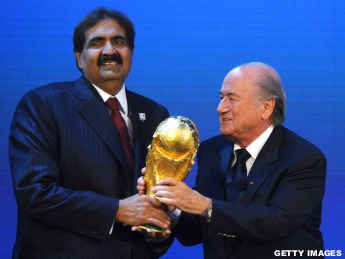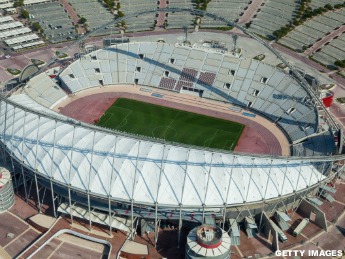
The odds against Qatar are mounting. After a summer of growing skepticism that Qatar can uphold its lofty promises as a World Cup host, one FIFA official told Reuters that he believes the 2022 World Cup "will not take place in Qatar."
Theo Zwanziger, an executive committee member for FIFA, said that medical concerns raised by the high daily temperatures in Qatar are too high to host the international soccer tournament. In addition to player safety concerns, the risks faced by tourists coming into the region would be far too great, with injuries and possible fatalities a very realistic possibility.
The executive committee of FIFA, according to Zwanziger, does not want to be held accountable for those incidents.
That may be FIFA's justification for pulling the World Cup bid from Qatar, but it's hardly the only reasonable justification. In fact, FIFA should have needed to look no further than the human rights abuses suffered by Nepali migrants forced to build the stadiums in Qatar. According to a report from Human Rights Watch, roughly 4,000 migrant workers are expected to die in the process of building Qatar's World Cup infrastructure.
That's roughly one individual per day, and it elevated the clamor for FIFA to reverse its decision. But after months of relative inaction, the organization may be moving toward a decision.
FIFA released a statement later in the afternoon Monday that distanced the committee's views from Zwanziger's opinion. But you don't have to infer much from Zwanziger's comments to conclude that the committee is seriously considering moving the 2022 World Cup from Qatar.

Qatar, meanwhile, insists that it remains the unquestioned host. It's the type of statement you would expect from a country that has no control over its own fate -- denial is the best weapon it has. Qatar can't change the weather, even if it has promised air-conditioned outdoor soccer stadiums, and the threat to tourists on the sweltering streets is a problem the rich, if small, nation can't solve.
The bigger challenge FIFA faces is finding a suitable replacement on short notice. There's a reason World Cup bids are handed out years in advance: It takes time to build those massive stadiums. Most countries don't have eight to 12 massive soccer stadiums sitting around waiting to be used, so some planning is typically involved.
If FIFA seeks a new 2022 host now, it faces a very short timeline that would rule out most potential host nations that can't build enough infrastructure fast enough.
One notable exception is the United States. Thanks to its unmatched love for professional sports -- or, more accurately, its pattern of accommodating billionaires team owners who threaten to move a beloved franchise if that city doesn't plunk down hundreds of millions to build a new stadium -- America is ripe with exactly the type of oversized stadium FIFA desires.
A slew of stadiums would likely only need minor renovations or modifications to be ready to host World Cup matches. Major American cities, meanwhile, already have the infrastructure to handle the influx of soccer enthusiasts because, between all the major sports teams that call the United States home, we do this basically every day.
Moreover, the United States is more economically stable than other prospective hosts might be, and FIFA had already been looking at bringing the World Cup back to North America in the near future.
The U.S. should leap at this opportunity, and it will. Because unlike Brazil, South Africa and other recent World Cup hosts, which pour enormous sums of money into hosting the World Cup with little guarantee of turning a profit, America could make a pile of money in short order. The only real way to cash in on hosting the World Cup is to use facilities that already exist, and America has that opportunity.
Right now the most pressing issue is getting the World Cup out of Qatar. But that looks more like a case of when, not if.


































